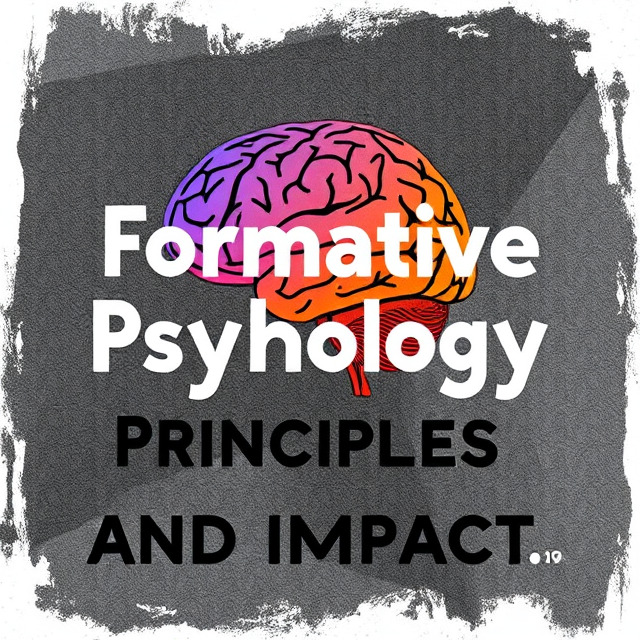Formative brain investigation is a term that can bring out a collection of propositions depending on the setting in which it is utilized. In substance, formative brain inquiry insinuates the consider of how early experiences, common impacts, and inborn characteristic components contribute to shaping an individual’s mental makeup over time. The word “formative” proposes that these early experiences are essential in the course of action of personality, cognitive capacities, and eager flourishing, making the formative brain inquire around a basic subfield in understanding human development and behavior.
In this web diary, we will examine the foundations of formative brain inquiry, its significance in human progress, and how this concept interferes with arranged mental theories and down-to-earth applications.
1. Understanding the the concept of Formative Psychology
Formative brain inquiry roughly is concerned with the period in human life when the mental foundation is laid—primarily in childhood and early youth. In the center of this facilitate, the individual is most responsive and impacted by exterior shocks, social instinctively, and interior shapes that collectively select future behavioral plans and cognitive styles.
The term “formative” diagrams an organize of “shaping” or “molding,” which is sensible both to the development of children’s mental capacities and their interior sense of character. This concept covers a few major schools of thought regarding the internal parts brain investigated, such as the developmental brain, cognitive brain inquire around, and social brain inquire around, all of which see how formative experiences play a key divide in shaping character, behavior, and eager regulation.
Key Benchmarks of Formative Psychology
Formative brain inquiry nearly is directed by a few central principles:
. Principal Periods: Examine in developmental brain inquiry nearly supports that there are essential or fragile periods in a child’s life in the center of which certain mental capacities—such as tongue change, social holding, and energized regulation—are most defenseless to characteristic influences.
. The Divide of Early Experiences: To start with a few a long time of life are especially essential for enthusiastic and cognitive advance. Early cleverly with caregivers, peers, and the enveloping environment take off persevering carves on the individual’s psyche.
. Nature vs. Keep up: Formative brain inquiry around analyzing the advancing interaction between normal slants (nature) and ordinary impacts (keep up). In showing disdain toward the reality that natural qualities provide a foundation for certain behaviors, experiences in the center of formative a long time can alter how genetic potential is expressed.
. Alliance and Holding: Early enthusiastic affiliations to caregivers are crucial in formative brain look at. The association hypothesis, made by John Bowlby, underscores the centrality of secure connection for sound enthusiastic development.
2. Speculations of Change Fundamental to Formative Psychology
Several well-known speculations in brain investigation allow an understanding of the noteworthiness of formative experiences. These hypotheses highlight particular centers of advanced orchestration and clarify how early experiences contribute to long-term mental outcomes.
a) Psychosocial Movement: Erik Erikson’s Stages of Development
Erik Erikson, a self-evident psychoanalyst and developmental auditor, proposed a hypothesis of psychosocial advancement that ranges over the total human life desire. Concurring to Erikson, each organization of modify presents a specific challenge or crisis that must be settled for sound mental movement. The to start with stages of Erikson’s layout are particularly formative:
. Recognize vs. Address (Most dependable stages): The infant’s vital errand is to recognize their caregivers and the world around them. If this organization is taken care of well, the child makes a sense of security and a conviction that the world is by and secure. Obstructed desire to resolve this battle may result in uneasiness and insecurity.
. Autonomy vs. Disfavor and Address (Toddlerhood): As children begin to explore their opportunities, they make adaptability. Solid child-raising leads to a sense of self-control, though over-the-beat control or input can lead to conclusions of disfavor and doubt.
. Action vs. Fault (Preschool a long time): In this organization, children begin to affirm themselves and make improvements in unmistakable works. A strong adjustment of back and heading makes certainty, whereas as well much unforgiving or controlling responses can cause fault and inhibition.
b) Cognitive Development: Jean Piaget’s Stages of Cognitive Development
Jean Piaget’s theory of cognitive development emphasizes how children’s consideration progresses in stages as they make. Piaget’s work centered on how early experiences shape mental abilities:
. Sensorimotor Organize (0–2 a long time): Infant child children begin to relate with their environment through their resources and motor works out. Address changelessness, or the understanding that objects continue to exist without an address when they are out of find, is a basic point of reference in this stage.
. Preoperational Organize (2–7 a long time): Children make commonplace considering, lingo, and imaginative imperativeness, but their considering remains self-centered (i.e., they have to bother understanding centers of see other than their claim). Experiences at this organization impact future cognitive versatility and social interactions.
. Concrete Operational Organize (7–11 a long time): Children begin to think dependably approximately concrete objects and events. Formative experiences related to school, peer affiliations, and problem-solving in the center of this organization contribute insides and out to the development of commonsense thinking.
c) Behaviorism and Characteristic Impact: B.F. Skinner and John Watson
Behaviorism, popularized by clinicians like B.F. Skinner and John Watson, emphasize the allocate of exterior shocks in shaping behavior. Concurring with this point of see, formative experiences (such as strengthening, teaching, and modeling) have a sensible impact on an individual’s development.
. Operant Conditioning (Skinner): Skinner’s hypothesis of operant conditioning sets that behavior is shaped by back and taught. Early childhood experiences with positive and negative fortress can have enduring impacts on behavior patterns.
. Classical Conditioning (Pavlov and Watson): Classical conditioning, as laid out in Watson’s “Little Albert” endeavor, shows up up how enthusiastic responses can be conditioned by affiliations. In formative brain investigation, excited reactions learned in early childhood can impact a person’s energized responses and behavior a brief time a while later in life.
3. Formative Brain inquiry around and Personality Development
A major zone of the center inner parts of the formative brain inquire nearly is the progress of the character. Personality proposes the characteristic plans of considerations, conclusions, and behaviors that make individuals curious. Early formative experiences play a vital allocate in shaping these patterns.
Association Speculation: The Affect of Early Bonds
Attachment theory, made by John Bowlby, emphasizes the centrality of early energized bonds between children and their caregivers. These bonds pass on a secure base from which children can see the world, and they serve as a foundation for a while a while later affiliations. Concurring to connection theory:
. Secure Association: Children who experience unfaltering, supporting care are likely to make secure affiliations. This prompts strong self-esteem, lively course, and interpersonal capacities all through life.
. Beguiling Alliance: On the other hand, children who think ignore, inconsistency or eager division from caregivers may make beguiling connection styles, which can result in challenges in forming consistent affiliations and arranging emotions.
4. Ordinary and Socio-Cultural Factors in Formative Psychology
While much of the formative brain looks at centers on characteristic and familial factors, socio-cultural impacts are as well fundamental in shaping mental progress. These impacts interface the broader social environment in which a child makes up, tallying their community, culture, cash-related status, and without question the political climate.
a) Social Impacts on Mental Development
Cultural values, estimations, and sharpens affect formative development in ways that create past the quick family unit. For format, in collectivist social orders, complement is set on hoard concordance, family-related, and social commitment, even though in individualistic social orders, there is a more recognizable complement on person autonomy and achievement. These social presentations shape children’s characters, values, and social behaviors.
b) Cash-related Components and Get to to Resources
Children raised in circumstances with fewer resources or under exasperating budgetary conditions may stand up to essential challenges to strong mental advance. Lower cash-related status (SES) is related to extended extend, presentation to bother, and compelled access to instruction and healthcare, which can obliterate cognitive and energized development.
5. Down to Soil Applications of Formative Psychology
Understanding formative brain investigation has principal recommendations in a combination of sensible zones, such as instruction, child raising, psychotherapy, and policy-making.
a) Instruction and Learning
In instructor settings, educators and caregivers can utilize data from formative brain investigation to make circumstances that back come full circle change. For case, understanding the centrality of early connection and socialization can enlighten strategies to make positive peer affiliations and energized competence in school-aged children.
b) Child raising and Child Rearing
Parents can utilize formative brain investigation to encourage their child-rearing to sharpen, ensuring that they donate supporting, responsive care that reinforces enthusiastic and cognitive advancement. Methods like positive fortress, secure connection, and age-appropriate challenges can offer offer help shape children’s mental well-being.
c) Treatment and Intervention
Therapists working with children or grown-ups can draw on the benchmarks of formative brain look at to get it how early experiences impact current mental flourishing challenges. Psychotherapeutic medications such as cognitive-behavioral treatment (CBT) and attachment-based treatment can address issues stemming from formative experiences and advancement healing.
d) Course of movement and Social Services
Governments and social organizations can utilize encounters from the formative brain to coordinate approaches that back strong early childhood movements. Early childhood instruction, parental take-off courses of movement, and mediation for at-risk children can have an essential effect on long-term mental outcomes.

